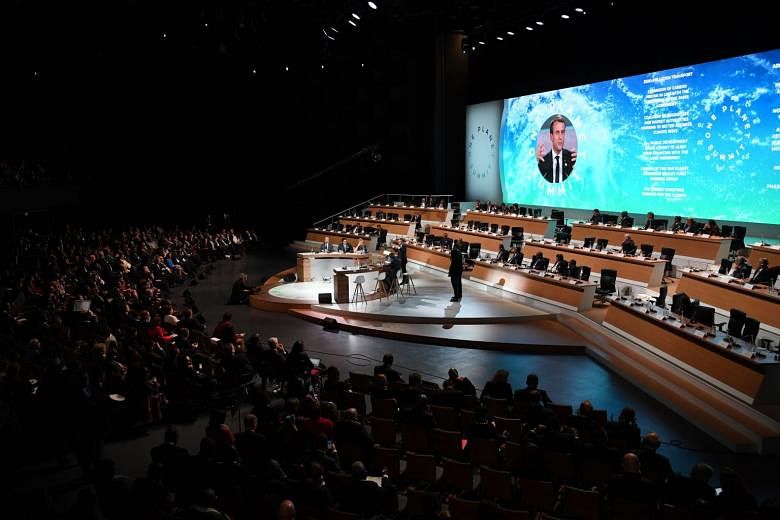Science is revealing every day the danger that climate change poses to the world, French President Emmanuel Macron said at the One Planet summit this week.
"We are losing the battle," he told dozens of world leaders and executives.
It's a warning to be heeded.
Climate change is triggering more extreme weather events such as droughts, floods and storms, disrupting livelihoods and economies.
"We're not moving quickly enough. We all need to act," Mr Macron said on Tuesday (Dec 12), seeking to accelerate efforts to fight climate change.
The mission weakened this year when President Donald Trump said he was pulling the United States out of the Paris Agreement, an international accord brokered in the French capital in 2015.
The One Planet summit did not aim to yield new binding commitments from governments. But it did move the needle in pledges to speed up financing for cleaner energy and a shift away from polluting fossil fuels.
A major demand from poorer nations is that richer economies accelerate access to financing for renewable energy and cleaner transport. Developing nations, including India, China and Indonesia, now produce well over half of greenhouse gas emissions.
The summit also focused on putting pressure on corporate giants to shift towards greener policies.
For example, more than 200 institutional investors with US$26 trillion (S$35 trillion) in assets under management said they would step up pressure on the biggest corporate greenhouse gas emitters to fight climate change.
The World Bank said it will no longer finance upstream oil and gas projects after 2019, apart from certain gas projects in the poorest countries in exceptional circumstances.
And French insurer AXA said it would quadruple investments in environmentally friendly projects, adding €$9 billion (S$14.3 billion) by 2020, and divest further from the coal industry.
While these pledges are welcome, they alone will not save the planet.
Scientists say global greenhouse gas emissions must peak by 2020 and then start to quickly decline if the world is to have any chance of keeping warming to within 2 deg C above pre-industrial levels.
Even a 2 deg C warming risks catastrophic climate change, scientists say.
So, there is very little time to halt the growth of emissions, which are set to rise this year.
The Global Carbon Project, which monitors annual growth in emissions from fossil fuels and industry, said last month in its annual report that emissions this year are projected to increase by 2 per cent after three years of almost no growth, reaching a new record of 36.8 billion tonnes of carbon dioxide (CO2).
Global average temperatures have already risen 1 deg C over pre-industrial levels and 2014, 2015 and 2016 were, in succession, the hottest years recorded in modern times.
And each year, more and more greenhouse gases from industry, transport, deforestation and agriculture accumulate in the atmosphere. This will result in more warming for years to come since CO2, the main greenhouse gas, stays in the atmosphere for decades.
Underscoring Mr Macron's warning, researchers said recently that global warming is outpacing current forecasts. They found that the UN forecast for global warming is about 15 per cent too low, which means end-of-century temperatures could be 0.5 deg C higher than predicted.
That could make the goal of capping global warming at "well under" 2 deg C even more challenging.
The results also suggest steeper greenhouse gas emissions reductions than previously calculated, the authors wrote.
"If emissions follow a commonly used 'business as usual' scenario, there is a 93 per cent chance that global warming will exceed 4 deg C by century's end," said co-author Ken Caldeira from Carnegie Institution for Science at Stanford University in California.
Other studies released this week also painted a worrying picture.
A rapidly warming Arctic, where temperatures are rising twice as fast as the rest of the planet, is the "new normal", and the melting ice is triggering environmental changes that will affect the whole world.
Global warming also made Hurricane Harvey's deadly rains three times more likely.
Harvey, which made landfall in Texas in August, brought unprecdented downpour and severe flooding that was 15 per cent more intense due to climate change, the Guardian reported.
The storm left 80 people dead and 800,000 in need of aid.
In California, more than 40 people have died and some 9,000 structures destroyed by the deadliest wildfires in the state.
Governor Jerry Brown said the fires should serve as a warning for other parts of the world.
"These fires are going to become a very frequent occurrence, that's what the science is telling us," he told Agence France-Presse.
Dr Caldeira told The Straits Times that the longer nations wait to cut emissions, the greater the risks they face.
"If we expect to substantially reduce climate damage and climate risk, we need to be building the world's new clean energy system as fast as possible," he said in an e-mail.
"Instead, we seem to be building more of last-century's dirty old energy system. It is never too late to reduce emissions, but it is too late for us to avoid substantial amounts of climate damage," he added.


